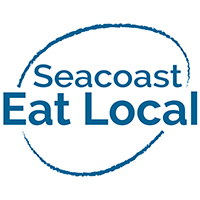Coppal House Farm is a 78-acre diversified family farm that is owned and operated by Carol and John Hutton. Located in Lee, New Hampshire, the Huttons are taking full advantage of the four seasons in New England to optimize the efficiency and productivity of their land.
And while efficiency and productivity matter tremendously on a farm—especially when the farm is paying the mortgage—those words don’t capture the elegance of their farm design, a series of interconnected ventures that “compliment, not compete” with one another.
For starters, there is a public event during three seasons of the year: a beautiful Sunflower Festival in summer; a five-acre Corn Maze in fall; and horse-drawn sleigh and wagon rides in winter. Spring is time to prepare for it all: planting sunflowers and corn, making hay to feed the horses, and a multitude of other farm tasks. Year-round, Coppal House sells through their on-site farm store (which really ramps up at the end of July), online, and at multiple farmers’ markets including Portsmouth and Exeter.
Then, there are the variety of products being grown and raised on the farm which include lamb, pork, and free-range chicken eggs; asparagus, garlic, rhubarb, winter greens, winter squash, and pumpkins; fall decor including straw, corn stalks, and gourds; sunflowers and their award-winning sunflower oil that they press, filter, bottle, and label onsite.
Finally, and this is where it really gets elegant, all of these endeavors intersect with one another in a holistic, closed loop system.
For example, the beauty of the sunflowers provides the main attraction for the sunflower festival, but the flower variety isn’t ornamental but culinary. Seed is selected for its high oil content for oil production, the blooms wow crowds who get to walk through the fields and then the seeds are used to produce sunflower oil. (The Hutton’s pursued the idea of sunflower oil after identifying a gap in the market when it came to local cooking oil. They tried canola first but the deer were too fond of their crop.) After the seeds are pressed and the oil extracted, the byproduct of the smashed sunflower seed hulls becomes high-protein feed for sheep and hogs. John and Carol estimate that 85% of their animal’s diet comes from grain & hay grown on the farm, which includes the sunflower seed meal, dramatically reducing feed costs and letting nothing go to waste. As their website says, “Our ultimate goal is to produce multi-use crops that aid in the sustainability of our farm and the local food system.”
John Hutton says that the diversification and whole systems approach is “key for small farms”—that and “not letting anything leave the farm wholesale.” With direct market, retail sales, the Hutton’s can secure the best price for their products, while also giving them a chance to interact with customers, which they love.
“A lot of farmers farm because they like solitude, but we like people. We like to talk!” Carol says, “We love to invite people to our farm.” It’s part of what makes their farm successful: a welcoming environment to bring the family, have hands-on experiences, meet your farmers, and establish annual family traditions.
And you won’t be disappointed—the public events are bursting with activities beyond the main event.
The Sunflower Festival, which runs from Saturday, July 30 through Sunday, August 7 boasts live music, kids activities, a craft fair with over 35 vendors (weekends only), food vendors, a wine garden by their neighbors Flag Hill Winery, a sunflower variety garden showcasing multiple shapes, colors, and textures of blooms, ice cream and gelato, and more—all in addition to the five acres of gorgeous sunflowers to meander through and take photographs in. Opening day sees upwards of 3500 people attending, with a steady 1000 people each weekday.
The Corn Maze, which opens September 3 and runs through October 30, features a new design each year and in 2022 will be a praying mantis. (Check out their website to see the awesome past designs). In addition to five acres of sprawling corn to wind through, there will be horse-drawn wagon rides, a craft fair (September 17 & 18), trivia within the maze, and a bursting farm store with pumpkins, fall decoratives, winter squashes, meats, eggs, jam, spices, and cooking oil, as well as other wonderful locally sourced products including honey and maple syrup. In addition, flashlight night mazes and private maze rentals are available.

In addition to being wonderful events on their own, Coppal House Farm donates 10% of all proceeds from the Sunflower Festival to five local nonprofits. To date, they have donated $85,000!
The benefits of such a diverse and welcoming farm don’t end there. When asked about their favorite parts of farming, John and Carol reflect on the value of agriculture for the local community in terms of open space and land preservation. John says: “If farmers can make a living, they’ll leave the land open and undeveloped. Plus, farmers don’t travel, so we’re good for the local economy.”
He adds:
“Unfortunately people don’t view agriculture as a serious living. One time I went to a town meeting dressed in a three-piece suit and everyone thought I was a lawyer. They didn’t believe me when I said no, I’m a farmer.”
But John, who started farming with a pair of oxen, a half-ton pickup, and a chainsaw, wants people to know farming is every bit as serious a profession as anything else. And when you look at all the tremendous value added to the community—food, entertainment, stewardship of land—and all the hard work that goes into making all of it happen, it’s a wonder that anyone could think otherwise.



In addition to attending their public events, you can support Coppal House Farm by shopping their stall at the Portsmouth and Exeter Summer Farmers’ Markets and the Stratham and Rollinsford Winter Farmers’ Markets. You can also visit their farmstand (open daily 10-5pm), join their egg CSA, or shop their online store.







